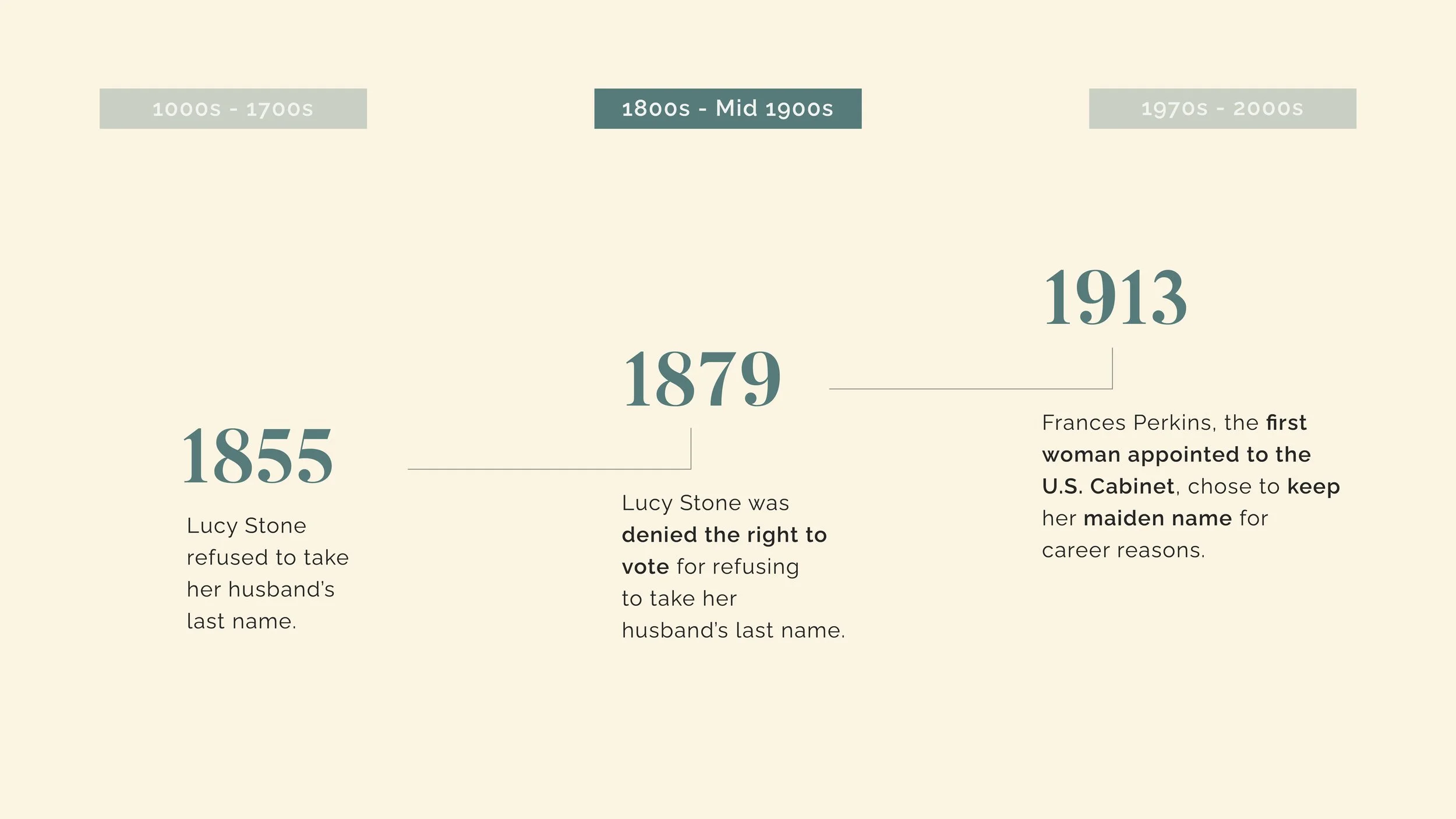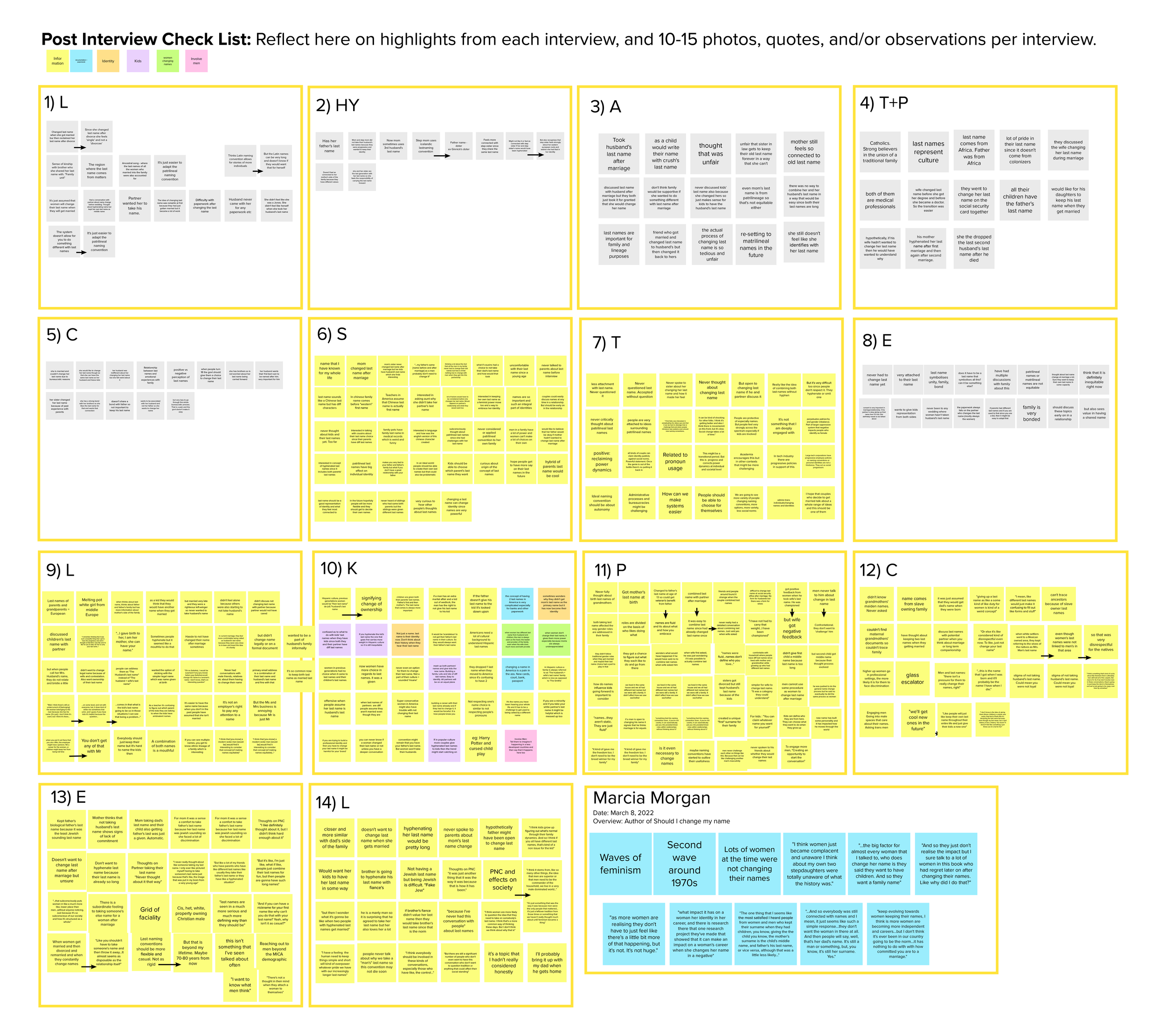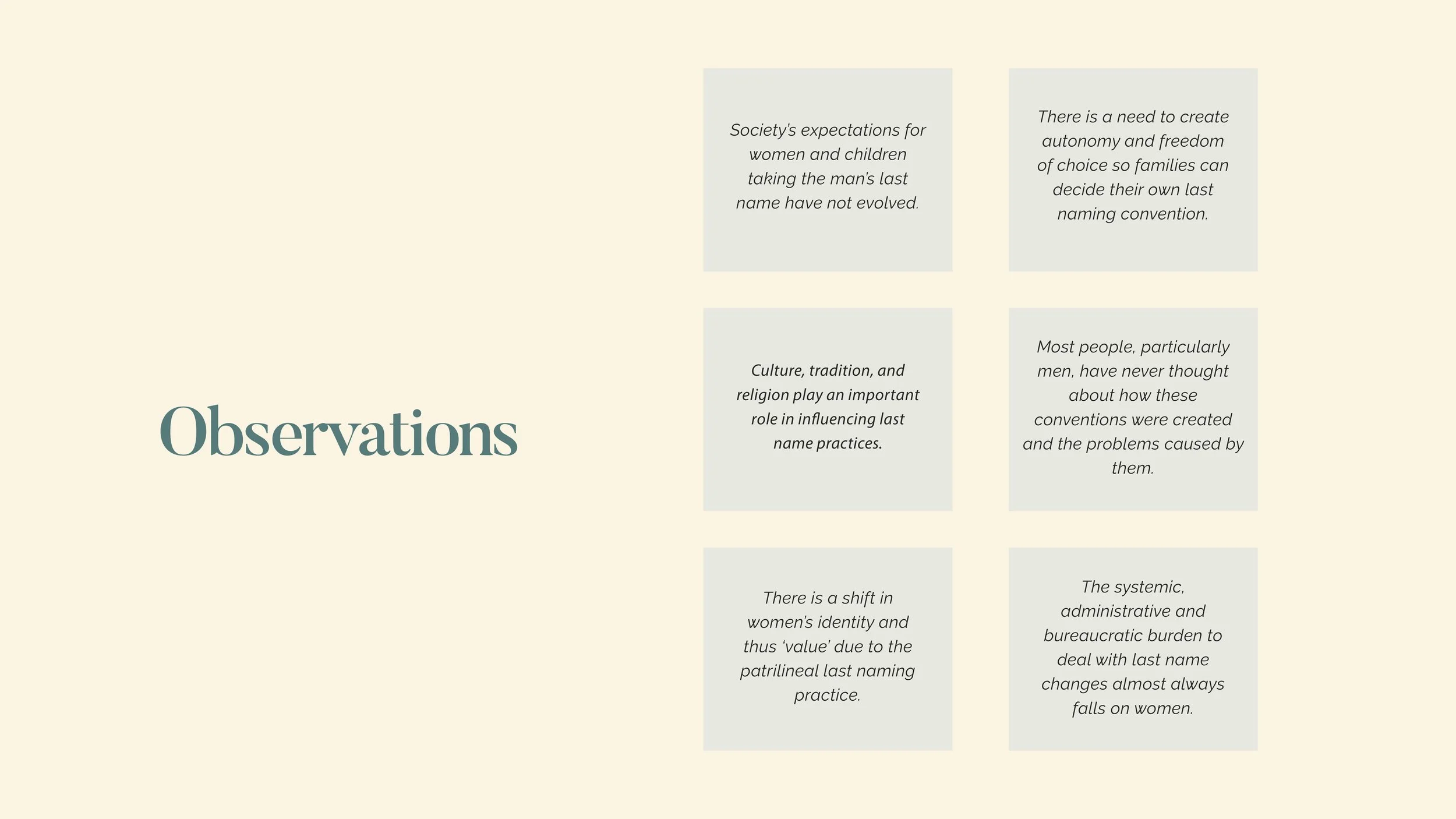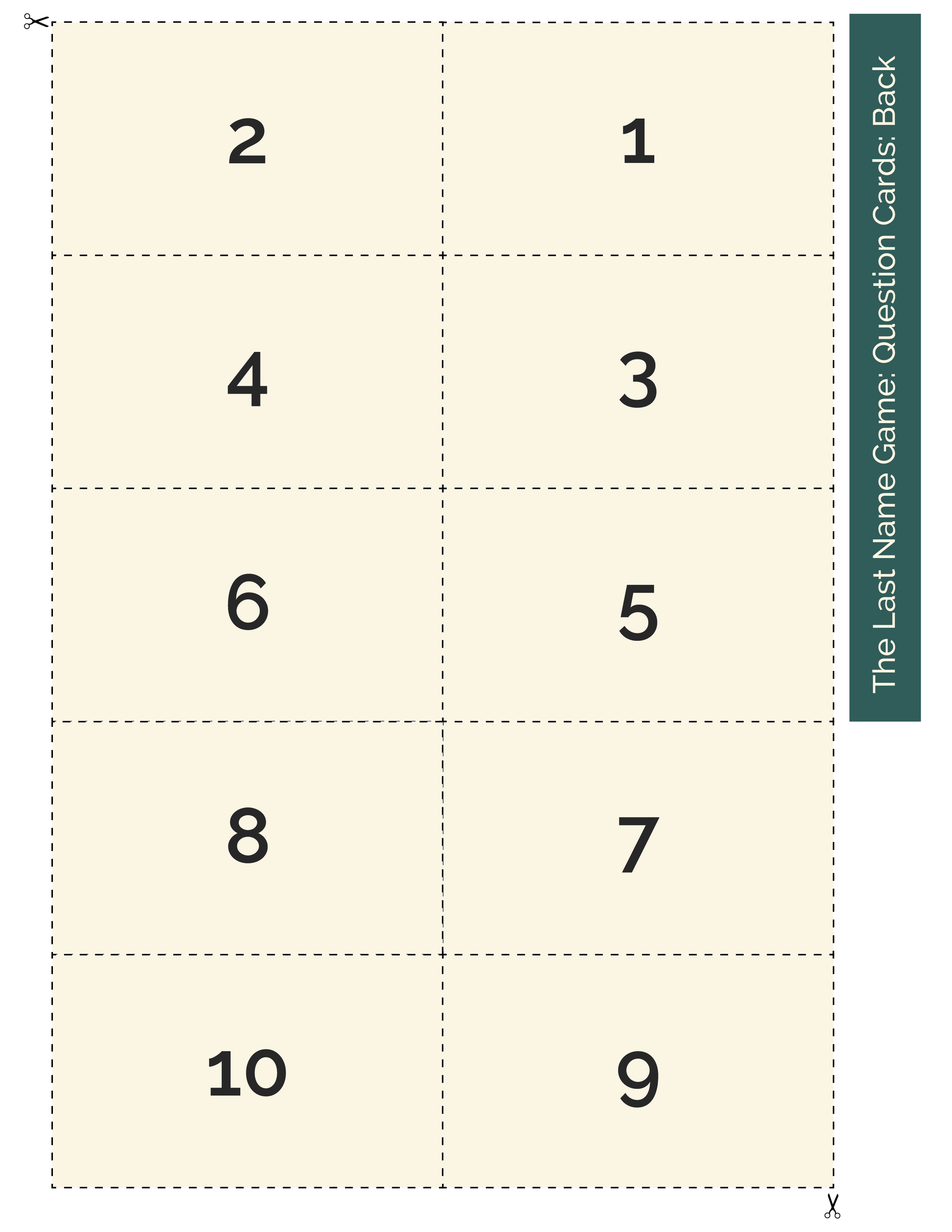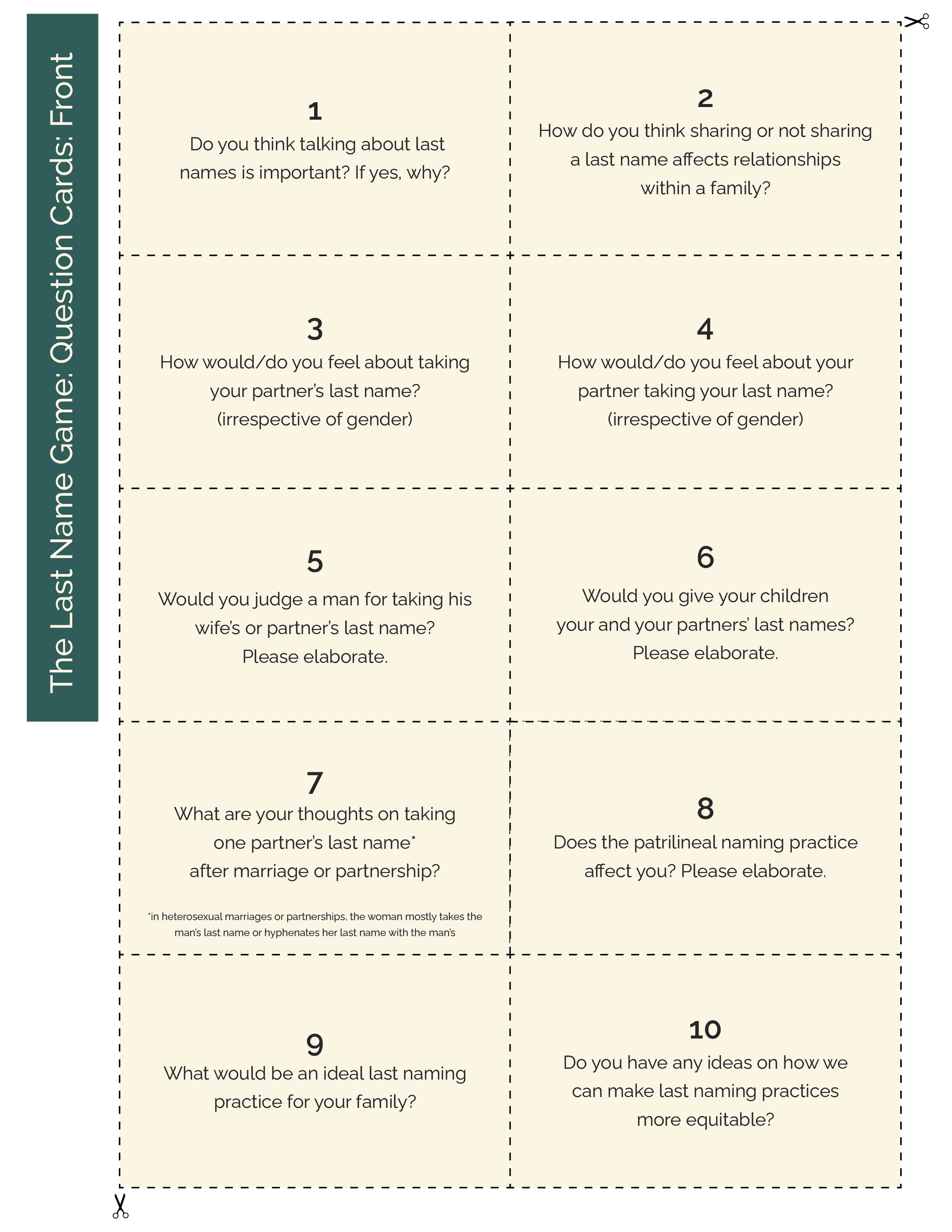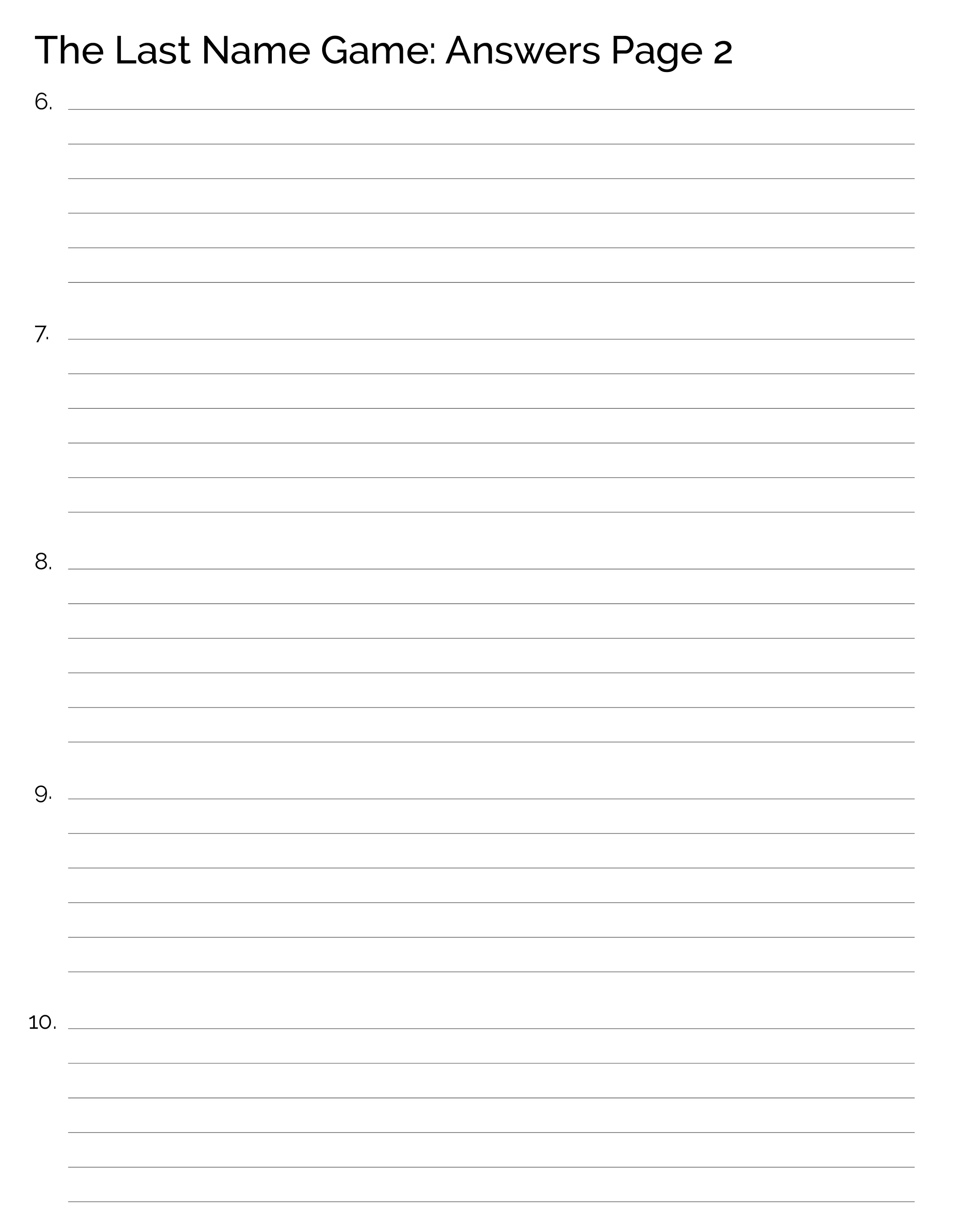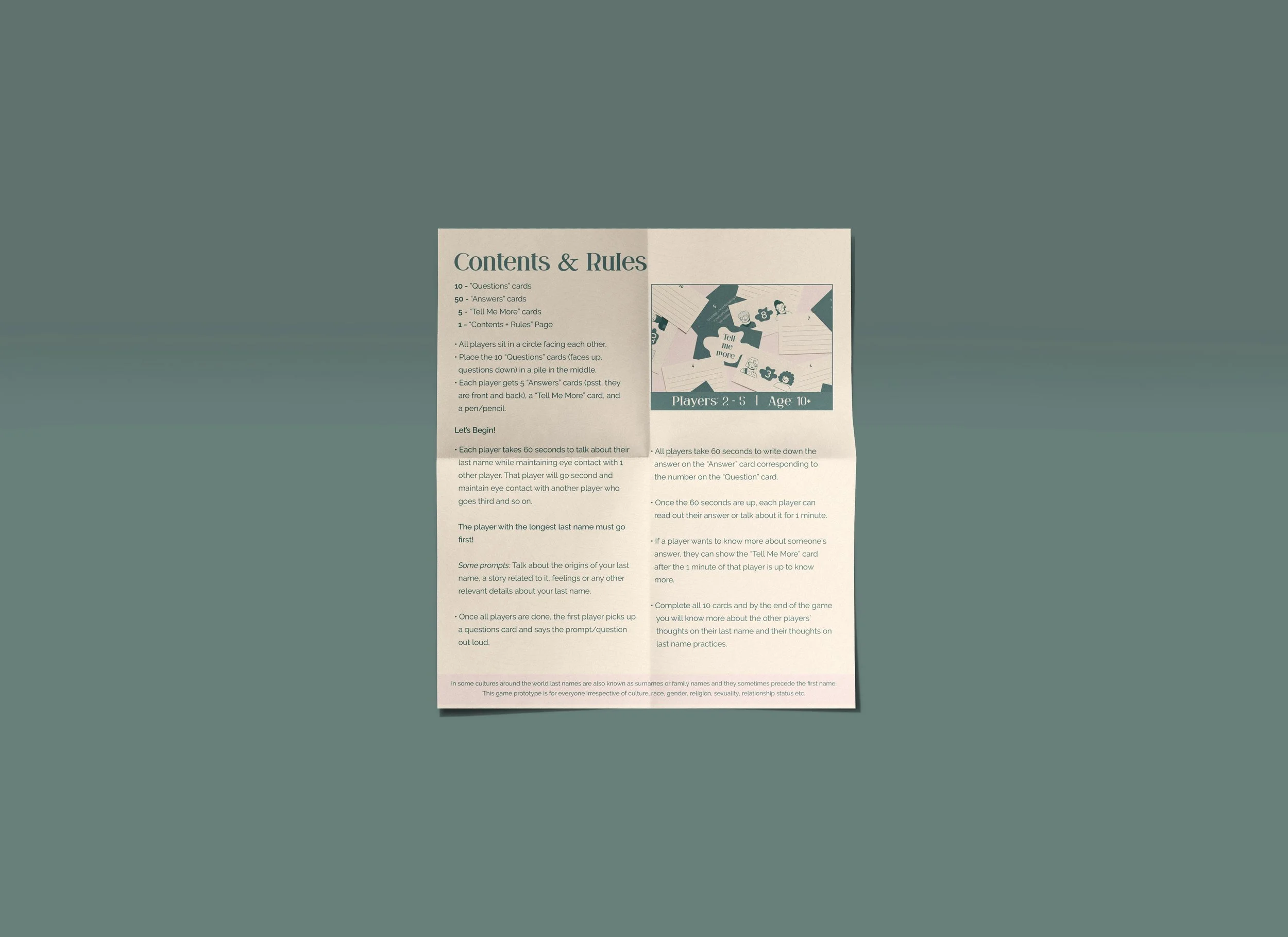
Human-centered Design, Design Research, Social Design
Understanding how patrilineal last naming practices result in gender inequity and how might these practices evolve.
For my MA in Social Design thesis, I wanted to understand how last naming practices perpetuate gender inequity in the U.S. To do so, I used the principles of human-centered design and conducted 20+ interviews, synthesised the data, and designed a game prototype to understand people’s perspectives on last naming practices and how they might evolve.
1. Framing the Problem
While I was contemplating on this topic for my research, I got asked several times, “why this?” Why last naming practices, when there are so many other issues related to gender discrimination that I could ‘prioritise’ instead? To understand why this I delved into secondary research so as to understand the history of these practices and the problems they create.
The History
-
In the year 1855, Lucy Stone, a vocal advocate and organiser promoting women’s rights, got married and refused to take her husband’s last name. Lucy was a suffragist and the first woman in almost a century who refused to take her husband’s last name. This decision also led to Stone being denied the right to vote in 1879.
The practice of taking a man’s last name has its roots in colonisation, and is based on a concept called coverture, wherein, a woman was ‘covered’ by her husband and thus lost her identity when she got married. So she could not make a will, own property, had no rights to wages she earned and even lost the rights to her own last name. -
Coming back to the present, the most recent data on marital naming is from 2015 and it shows that ~68.5% American women still take their husband’s last names after marriage. Another study shows that ~95% of the children in America are still given their father’s last name by default. And there is insufficient data when it comes to last name choices of people in same-sex, non-heterosexual or other relationships.
Voiced by Dr. LaShay Harvey
Problems due to the Patrilineal Naming Convention
-
Process of forgetting whole groups of relatives usually because they are not as significant in social life. Patrilineal conventions lead to paternal relatives being remembered as critical to current family identity and ancestral heritage. (Connell 2002, 142 & Nugent 2010, 500)
Close to 80% of the people I interviewed could not remember their grandmothers’ last names before marriage. -
Patriarchal Dividend, which can be defined as “an advantage that men receive from maintaining an unequal gender order”. When a wife takes the husband’s last name it is presumed that their children will also be named after the father which reinforces cultural expectations that no man is expected to change his name. This ensures the male privilege of a continuous identity and the social capital that comes with having one. (Connell 2002, 142 & Nugent 2010, 500)
Some married women I interviewed faced bureaucratic challenges at work places due to a change in their last name after marriage. The bureaucratic challenges of name change compound for divorced women who want to change their name back o their maiden name. Many choose to keep their ex-husband’s last name so as to avoid bureaucratic issues or simply because they want the same last name as their children and they don’t have any other choice.
Women also face challenges when they hyphenate their last names since it becomes more apparent that they are married and it is more challenging for married women to get jobs or even promotions.
-
The notion that culture takes time to catch up with technological or economic shifts. Despite marked gender-related shifts, patrilineal norms have not evolved at the same pace. (Connell 2002, 142 & Nugent 2010, 500)
Even today close to 70% of the women take their husband’s last name. The other alternative for women is to keep their maiden name but they eventually give in and change their last name when they have kids so the family can have the same last name. Some choose to keep their maiden name but then they don’t share a last name with their children. In a few cases, both partners choose to hyphenate their last names to create a family last name but this causes a new challenge of what the children might have to do once they grow up and have a family of their own. There is a lag in the evolution of last naming practices that are equitable.
-
“Your name is your identity...The cultural assumption that women will change their names upon marriage – the assumption that we'll even think about it, and be in a position where we make a "choice" of whether to keep our names or take our husbands' – cannot be without consequence...When women see our names as temporary or not really ours, and when we understand that part of being a woman is subsuming your own identity into our husband's, that impacts our perception of ourselves and our role in the world. It lessens the belief that our existence is valuable...and feeds into a female understanding of self as relational – we are not simply who we are, we are defined by our role as someone's wife or mother or daughter or sister.”
(Jill Filipovic, The Guardian)
2. Design Research
Research Methods
In order to understand the current culture and context of the problem here are the research methods I used:
Secondary Research: I gathered relevant information from research papers, a book by Marcia Morgan - “Should I change my name”, online articles and surveys on this topic
Expert Interviews: Laurie Scheuble, and Marcia Morgan
Google Survey: Received 14 responses
Personal interviews: Conducted 25 interviews
-
How do last naming conventions lead to gender inequity?
How do people feel about patrilineal naming conventions and its originations?
When and what kinds of conversations do people have about last naming practices?
What are some other last naming conventions that are practised currently and how are they evolving?
-
We want equity to be reflected in last naming conventions.
We want society to accept different last naming conventions irrespective of gender.
We want people to initiate conversations about the importance of gender equity within last naming conventions.
We want people of all gender to think about how last naming conventions affect gender equity.
We want women to feel that they have the freedom and ease to choose their last names after marriage.
We want men to accept women's decisions about their own names.
We want women to accept their decisions about their own names.
-
Inviting diverse perspectives: Talk to people of different genders, race, age etc.
Deferring judgement and biases: Set aside own biases about gender inequity and listening to different points of view without judgement.
Respect Boundaries: Being considerate towards an individual’s time, personal space, emotions, and confidential information. Given the sensitive nature of this subject, pose questions that are impartial and non-invasive.
Encouraging discussions over solutions: There may not be any definitive ‘solution’. The aim is to highlight the need to have conversations around last naming practices.
3. Synthesizing the Research Data
-
Most people, particularly men, have never thought about how these conventions were created and the problems caused by them.
Society’s expectations for women and children taking the man’s last name has not evolved.
Culture, tradition, and religion play an important role in influencing last name practices.
There is a change in women’s identity and thus ‘value’ due to the patrilineal last naming practice.
There is a need to create autonomy and freedom of choice so families can decide their own last naming convention.
The systemic, administrative and bureaucratic burden to deal with last name changes almost always falls on women.
-
Last names are universal and they are an important part of a person’s identity, yet, they are the most taken for granted, and therefore never thought about or talked about which makes them the most insidious.
-
How do we get people to think about last naming practices?
How do we engage people who identify as male in this conversation?
How do we encourage discussions about last naming practices among family and friends?
-
How might we generate conversations about last naming practices across cultures to reflect gender equity?
How might we build autonomy in last naming practices across cultures to reflect gender equity?
4. Ideation, Prototyping and Iteration
So, based on the ‘How Might We’ statements, in order to encourage discussions about last names, and to generate ideas on the evolution of last naming practices, I created a prototype for the Last Name Game. This game is for everyone irrespective of gender, age, race, religion, sexuality, relationship status etc.
The Last Name Game was designed so anyone, anywhere could easily download, assemble, and play the game with their friends and/or family to learn more about each others’ perspectives.
I also facilitated 3 sessions and observed how people played this game with their friends or family.
The Last Name Game - Prototype 1
The Last Name Game - Prototype 2
5. Reflection
My research is still in progress and I hope to continue it by spreading awareness about this problem and encouraging people to start having conversations about their last names. For I believe that when we start talking about something like this and being more mindful about our choices related to last names , only then can we lead a path to real social change.
Here’s a photo of a card made by my 5 year old niece. She signs off as Medhavi Gadia Padia. ‘Gadia’ which is her legal last name (her father‘s last name) and ‘Padia’ which is her mother’s maiden name. If a 5 year old can understand the importance of carrying forward both lineages, so can we.
Attribution: The illustrations of the characters on the game prototype 2 were taken from freepik.com. Image by pikisuperstar:
<a href="https://www.freepik.com/free-vector/group-people-avatars-collection_7259688.htm#page=2&query=avatars&position=35&from_view=author">Image by pikisuperstar</a> on Freepik




